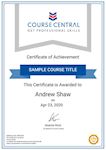Six Sigma
3 Courses Bundle | *** Holiday Gifts : Free PDF & Hard Copy Certificate | Lifetime Access
Course Central
Summary
- Certificate of completion - Free
- Exam(s) / assessment(s) is included in price
- Tutor is available to students
Overview
This Six Sigma 3 courses bundle is designed for professionals who want to thrive in their profession. The Six Sigma 3 course covers all the essential skills and knowledge needed to become specialised in this sector. You will learn real life knowledge and expertise from the industry experts and practitioners from this Six Sigma 3 courses bundle.
This Six Sigma 3 courses bundle consists of the following courses:
- Course 1: Six Sigma
- Course 2: Project Manager
- Course 3: Project Management
The Six Sigma 3 courses bundle starts with the basic knowledge of Six Sigma and gradually shares expertise knowledge. In this course you will get a complete idea of Six Sigma with key concepts, strategies regarding use of it and in-depth knowledge. The Six Sigma 3 courses bundle is completely an online course. You can access this course from any part of the world with just a smart device and the internet.
By the end of this course, you will get complete knowledge and marketable skills. The course also comes with a certificate, which will add extra value to your resume and help you stand out in the job market. In short, Six Sigma 3 courses bundle is the perfect course to fast track your career. So, what are you waiting for? Enrol this course today!
What you will learn from the Six Sigma bundle course?
- Lean Management and Lean Manufacturing since this course is designed for all
- sectors. Recognise waste and eliminate it with almost 100 tools.
- Become certified in Lean Management.
- Draw Value Stream Maps as a first step to get rid of inefficiency in your processes.
- Make a transition from push production to JIT/Pull production.
- Learn ultra fast. We use teaching methods that make students understand
- concepts quickly. No need for endless repetitions. We respect your time.
- Calculate takt time and cycle time to mitigate bottlenecks and improve process
- speed.
- Reduce the Lead Time of any process, thereby satisfying your client demands
- faster.
- Set up basic experiments as part of Six Sigma DMAIC.
- Apply OEE (Overall equipment effectiveness) in manufacturing or services like IT
- sector
- Improve supply chains
- Apply the 5S methodology to redesign the workplace.
- Use Quality Function Deployment to (re)design your products and services.
- Identify and mitigate various forms of waste or inefficiencies.
- Perform research based on the Six Sigma DMAIC methodology.
- Apply the Poke Yoke principle to prevent mistakes by workers and customers.
- Apply the SMED principle to facilitate speedy change in production.
- Apply the Andon principle to quickly identify process problems.
- Apply the Heijunka or production leveling principle to be able to respond fast to
- customer demands.
- Apply Little's Law
- Learn Kanban
- Define the roles and responsibilities of a successful project manager
- Deal effectively with supporters, critics and bystanders
- Explain how to initiate a project
- Create time scales on getting the job done using milestone planning
- Understand how projects work and be able to control your project process
- Achieve fair and effective allocation of project responsibilities
- Work with the project team to plan a project
- Predict problems and plan your responses
- Monitor and control the project activities
- Describe project management skills, roles, and responsibilities
- How to develop a project plan, including scoping, sequencing tasks, and
- determining a critical path
- How to execute projects and use the earned value approach for monitoring and
- controlling progress
- Build a work breakdown schedule
- Explain the project management life cycle and compare different program
- management methodologies
- The official baseline for the project scope – the work breakdown structure.
- The essential elements of the project cost breakdown.
- Documenting the planning in a concise project management plan for sponsor review.
- The essential elements of managing the project schedule.
- How to initiate, define and organize a project
- ...And Much More
Why Choose the Six Sigma 3 courses bundle?
- Conducted by industry experts
- Get Instant E-certificate
- Fully online, interactive course with Professional voice-over
- Developed by qualified professionals
- Self paced learning and laptop, tablet, smartphone friendly
- Tutor Support
And you will also get these gifts
- Free PDF Certificate
- Free Hard Copy Certificate
- Lifetime Course Access
Course media
Description
Course Curriculum
*** Course 1: Six Sigma ***
Overview of Lean Six Sigma
- History of Lean Six Sigma
- Main roles in Lead Six Sigma
- Six Sigma metric
- The steps of Six Sigma
- Self-assessment
- Plus more
Six Sigma Basics
- Basics of Six Sigma
- Difference between DMAIC and DMADV
- Project Management: A Challenging Field
- Six Sigma DMAIC Methodology
- Six Sigma Challenges
- Self-assessment
- Plus more
The Define Phase
- Lean Six Sigma Projects
- Problem Statements
- Critical to Quality
- Voice of Customer
- Self-assessment
- Plus more
The Measure Phase
- Introduction to Measurement
- Process Mapping
- Process Performance Baseline
- Mapping Value Streams
- Self-assessment
- Plus more
The Analyse Phase
- Analysis of the root cause
- Types of waste
- Value Analysis
- Self-assessment
- Plus more
The Improve Phase
- Selecting Improvement Solutions
- The Ease and Effect Matrix
- Risk Management
- Self-assessment
- Plus more
The Control Phase
- Sustaining Improvement
- Statistical Process Control
- Ongoing process measurement
- Self-assessment
- Plus more
Project Improvement Tools
- Tools for project Improvement
- Check Sheets and Flowcharts
- Scatter Diagrams and Histograms
- Pareto Analysis, Control Charts and Cause-and-Effect Diagrams
- Improvement Tool Activity
- Self-assessment
- Plus more
Management Tools for Generating Ideas
- Tools for generating ideas
- Brainstorming and Affinity Diagrams
- Other Idea Generating Techniques
- Self-assessment
- Plus more
Project Life cycle
- Initiation
- Strategic Plan
- Product Description
- Historical Information
- Project Selection Criteria
- Determining the Project Goals
- Project Deliverables
- Identifying the Key Stakeholders
- The Project Overview Document
- Identifying the Project Constraints
- Managing Constraints
- Project Sponsor
- Monitoring and Control
- Self-assessment
- Plus more
Continuous Improvement
- Six Sigma Continuous Improvement project
- Analyse the process data
- Improve the performance of the process
- Control the improved process.
- DMAIC steps for Carry out a continuous improvement project
- Self-assessment
- Plus more
Project Risk Management
- Planning for Risk Management
- Referring to the Project Charter
- Relying on Risk Management Policies
- Considering Roles and Responsibilities
- Examining Stakeholder Tolerance
- Using a Risk Management Plan Template
- Creating the Risk Management Plan
- Methodology
- Roles and Responsibilities
- Identifying the Project Risks
- SWOT Analysis
- Completing Qualitative Analysis
- Implementing Risk Monitoring and Control
- Examining the Results of Risk Monitoring and Control
- Self-assessment
- Plus more
Customer Relationships
- Customer Satisfaction
- Obtaining Customer Feedback
- Reliability
- Assurance
- Tangible
- Empathy
- Responsiveness
- Self-assessment
- Plus more
*** Course 2: Project Manager ***
- Module 1: Overview of Project Management
- Module 2: Project Life Cycle
- Module 3: Project Integration Management
- Module 4: Project Scope Management
- Module 5: Project Time Management
- Module 6: Project Cost Management
- Module 7: Project Quality Management
- Module 8: Effective Planning & Scheduling
- Module 9: Human Resource Management
- Module 10: Rewarding Employees
- Module 11: Organising Meetings
- Module 12: Managing Resources
- Module 13: Change Management
- Module 14: Crisis Management
- Module 15: Conflict Management
- Module 16: Stress Management
- Module 17: Communication Management
- Module 18: Procurement Management
- Module 19: Risk Management
- Module 20: International Project Management
- Final Exam
*** Course 3: Project Management ***
- Module 1 - Overview of Project Management
- Module 2 - Project Life Cycle
- Module 3 – Team and leadership
- Module 4 - Project Integration Management
- Module 5 - Project Scope Management
- Module 6 - Developmental Methodologies
- Module 7 - Project Time Management
- Module 8 - Project Cost Management
- Module 9 - Project Quality Management
- Module 10 - Effective Planning & Scheduling
- Module 11 - Human Resource Management
- Module 12 - Rewarding Employees
- Module 13 - Organising Meetings
- Module 14 - Managing Resources
- Module 15 - Change Management
- Module 16 - Crisis Management
- Module 17 - Conflict Management
- Module 18 - Stress Management
- Module 19 - Communication Management
- Module 20 - Procurement Management
- Module 21 - Risk Management
- Module 22 - International Project Management
- Module 23 - Project Performance
- Module 24 - Project Management Techniques
- Module 25 - Developing a Communication Plan
- Final Exam
Certification
By the successful completion of Six Sigma course, you will get an instant e-certificate. Our courses are fully updated with industry knowledge and skills that aim at making you an expert in the field. The hard copy of the certificate is also available and can be sent to your address. The delivery charge is applicable which will be £4.99.
Who is this course for?
This Six Sigma course is ideal for those who work in or aspire to work in the following professions:
- Lean is a methodology that is effective in every single sector.
- Regardless of whether you are working in IT, manufacturing, the military or health care.
- If you have a management position, an auditor position or a quality assurance position, this course is for you.
- It will boost your employability, skills set and salary.
- Anyone who wants to learn how to manage an entire project on their own
- People who find project management stressful - or feel their projects often run late or overspend
- Those who want to run smooth, efficient and impressive projects - and level up their career
- Someone who wants to do Project Management in their future career/li>
- Young professionals and university graduates interested in a project management career
- Anyone who wants to develop or enhance their project management knowledge and skills
Requirements
To complete this Six Sigma course, there is no previous experience required. You just need basic knowledge of understanding English and internet connection.
Career path
This Six Sigma training course will lead you to many different career opportunities, here are few prospects:
- Operations Manager - £60,000 per annum
- CTO - £65,000 per annum
- Quality Manager - £35,000 per annum
- Mechanical Engineer - £55,000 per annum
- Operations Team Leader - £40,000 per annum
- Quality Assurance Manager - £50,000 per annum
- Assistant Manager, Customer Service - £45,000 per annum
Questions and answers
Currently there are no Q&As for this course. Be the first to ask a question.
Certificates
Certificate of completion
Digital certificate - Included
Reviews
Currently there are no reviews for this course. Be the first to leave a review.
Legal information
This course is advertised on reed.co.uk by the Course Provider, whose terms and conditions apply. Purchases are made directly from the Course Provider, and as such, content and materials are supplied by the Course Provider directly. Reed is acting as agent and not reseller in relation to this course. Reed's only responsibility is to facilitate your payment for the course. It is your responsibility to review and agree to the Course Provider's terms and conditions and satisfy yourself as to the suitability of the course you intend to purchase. Reed will not have any responsibility for the content of the course and/or associated materials.



